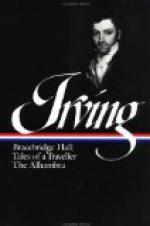She is a thin old lady, with blue eyes, and pointed nose and chin. Her dress is always the same as to fashion. She wears a small, well-starched ruff, a laced stomacher, full petticoats, and a gown festooned and open in front, which, on particular occasions, is of ancient silk, the legacy of some former dame of the family, or an inheritance from her mother, who was housekeeper before her. I have a reverence for these old garments, as I make no doubt they have figured about these apartments in days long past, when they have set off the charms of some peerless family beauty; and I have sometimes looked from the old housekeeper to the neighbouring portraits, to see whether I could not recognise her antiquated brocade in the dress of some one of those long-waisted dames that smile on me from the walls.
[Illustration: The Old Housekeeper]
Her hair, which is quite white, is frizzed out in front, and she wears over it a small cap, nicely plaited, and brought down under the chin. Her manners are simple and primitive, heightened a little by a proper dignity of station.
The Hall is her world, and the history of the family the only history she knows, excepting that which she has read in the Bible. She can give a biography of every portrait in the picture gallery, and is a complete family chronicle.
She is treated with great consideration by the squire. Indeed, Master Simon tells me that there is a traditional anecdote current among the servants, of the squire’s having been seen kissing her in the picture gallery, when they were both young. As, however, nothing further was ever noticed between them, the circumstance caused no great scandal; only she was observed to take to reading Pamela shortly afterwards, and refused the hand of the village innkeeper, whom she had previously smiled on.
The old butler, who was formerly footman, and a rejected admirer of hers, used to tell the anecdote now and then, at those little cabals that will occasionally take place among the most orderly servants, arising from the common propensity of the governed to talk against administration; but he has left it off, of late years, since he has risen into place, and shakes his head rebukingly when it is mentioned.
It is certain that the old lady will, to this day, dwell on the looks of the squire when he was a young man at college; and she maintains that none of his sons can compare with their father when he was of their age, and was dressed out in his full suit of scarlet, with his hair craped and powdered, and his three-cornered hat.
She has an orphan niece, a pretty, soft-hearted baggage, named Phoebe Wilkins, who has been transplanted to the Hall within a year or two, and been nearly spoiled for any condition of life. She is a kind of attendant and companion of the fair Julia’s; and from loitering about the young lady’s apartments, reading scraps of novels, and inheriting second-hand finery, has become something between a waiting-maid and a slip-shod fine lady.




